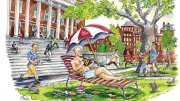1913
The Alumni Bulletin reports the laying of the cornerstone of the Harvard Club of Boston. A spokesman says the club will be “characterized by academic simplicity. We desire to be famous, not for our canvas-backs, but for our glorified corn-beef hash.”
1938
“A new function is developing” for the Harvard Summer School, state the Bulletin’s editors. “Thoughtful adults are discovering that the rapidly changing life of this dynamic world makes education a continuous process which can never be completed at any specified age or date. Many are turning to the summer school for opportunities to continue their intellectual growth, to increase their athletic enjoyment, and to gain new vitality for the obligations of modern life.”
1943
The Fogg Museum rearranges its storage areas to protect works of art in the event of an enemy bombardment of Cambridge.
1963
On the Peace Corps’ second anniversary, the 43 College alumni serving abroad place Harvard second only to Berkeley as a source of A.B.s in the Corps.
1978
The Faculty of Arts and Sciences discusses the proposed “Core Program,” described by its chief proponent, Dean Henry Rosovsky, as “not [going] back to basics—I detest that phrase—but forward to modern liberal education.”
2003
President Lawrence H. Summers unveils a “down payment” on financial aid, focusing on the Graduate School of Arts and Sciences and the public-service-related professional schools, including a package of grants and no-fee, below-market-rate loans.









